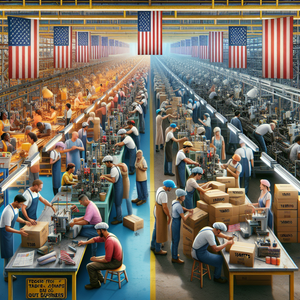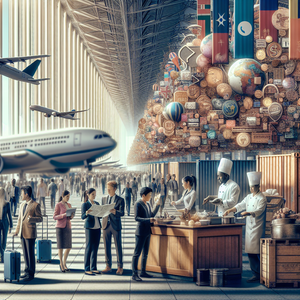
Navigating Careers in Trade, Pharma, and Supply Chain: Opportunities in a Tariff-Disrupted Economy
The global trade environment has experienced significant upheaval over the past several years, largely shaped by tariff implementations and evolving trade policies introduced during the Trump administration and beyond. While these measures aim to protect domestic industries, they have created substantial challenges across sectors such as pharmaceuticals, manufacturing, logistics, and trade policy. For instance, the pharmaceutical industry has faced rising production costs, regulatory complications, and risks of drug shortages stemming from tariff-imposed import restrictions. Similarly, manufacturers and automakers are grappling with supply chain disruptions, inflated operational expenses, and shifting sourcing strategies.
Job Summaries:
Trade Policy Analyst:
- Trade policy analysts assess the economic impacts of tariffs, trade agreements, and regulatory changes on industries, providing actionable insights to policymakers and corporate leaders.
- They evaluate scenarios like steel tariffs affecting automakers and recommend alternative sourcing strategies.
- A background in economics, international trade law, or public policy is essential.
Pharmaceutical Supply Chain Manager:
- Supply chain managers in the pharmaceutical sector navigate disruptions caused by tariffs by optimizing sourcing and ensuring compliance with trade regulations.
- They may find alternative suppliers to prevent drug shortages.
- A degree in supply chain management or business is crucial.
Customs and Trade Compliance Officer:
- These professionals ensure companies comply with customs laws amid shifting trade regulations.
- They track updates, prepare documentation, and mitigate penalties.
- Certifications like the Certified Customs & Logistics Specialist (CCLS) are beneficial.
Pharma R&D Strategist:
- R&D strategists in pharmaceuticals allocate resources to high-priority projects, balancing profitability and compliance amid rising production costs and regulatory hurdles.
- They may focus on cost-effective alternatives for tariff-affected drugs.
- A degree in life sciences or business is essential.
Global Trade Consultant:
- Global trade consultants help businesses navigate tariffs by analyzing sourcing alternatives and recommending market entry strategies.
- They may advise on relocating production to countries with favorable trade agreements.
- A background in international business or economics is advantageous.
Manufacturing Operations Manager:
- Operations managers oversee production lines and implement lean manufacturing techniques to mitigate tariff-induced cost increases.
- They may redesign workflows to reduce reliance on tariffed materials.
- A background in engineering or business management is required.
Logistics Coordinator:
- Logistics coordinators optimize shipping routes and manage delays caused by tariff-induced supply chain disruptions.
- They ensure compliance with international trade regulations.
- A degree in logistics or supply chain management is critical.
Economic Policy Advisor:
- Economic policy advisors evaluate the macroeconomic consequences of trade policies and propose solutions to balance protectionism with growth.
- They may recommend tax incentives to offset tariffs' inflationary effects.
- A background in economics or public policy is essential.
Import/Export Specialist:
- Import/export specialists navigate global trade technicalities amidst tariff challenges.
- They prepare customs documentation and develop strategies to reduce delays caused by tariff classifications.
- Their expertise ensures uninterrupted commerce.
Pharmaceutical Pricing Analyst:
- Pricing analysts evaluate the cost implications of tariffs on drug production and develop strategies balancing profitability with consumer affordability.
- They may recommend price adjustments to offset increased costs.
- A background in finance, economics, or healthcare management is essential.
Reshoring Project Manager:
- Reshoring project managers oversee the return of production to domestic facilities in response to tariffs.
- They evaluate costs and benefits of relocating operations.
- A degree in project management or engineering is preferred.
Trade Lobbyist:
- Trade lobbyists influence policymakers on behalf of industries affected by tariffs.
- They may advocate for exemptions or reduced rates for specific goods.
- A background in political science or law is essential.
Drug Manufacturing Compliance Officer:
- Compliance officers ensure pharmaceutical manufacturing aligns with tariff regulations.
- They oversee production process changes to avoid penalties.
- A degree in regulatory affairs is required.
Risk Management Analyst:
- Risk management analysts identify and mitigate tariff-related risks, such as supply chain disruptions.
- They develop contingency plans to help businesses adapt to trade uncertainties.
Global Sourcing Specialist:
- Global sourcing specialists diversify supply chains by identifying alternative suppliers and negotiating contracts.
- They ensure cost-effective procurement amid tariff challenges.
Trade Economist:
- Trade economists assess the economic impacts of tariffs, advising governments and corporations on balancing trade protectionism with growth.
- They provide critical insights into trade dynamics.
Pharma Distribution Manager:
- Pharma distribution managers optimize logistics networks to mitigate disruptions caused by tariffs, ensuring essential medications reach patients efficiently.
Industrial Engineer:
- Industrial engineers design efficient systems to reduce costs.
- They help manufacturers adapt to tariffs without compromising quality or output.
While tariffs pose significant challenges for industries, they also present opportunities for skilled professionals to innovate and adapt. Roles such as supply chain managers, trade economists, and global sourcing specialists are more critical than ever. By honing the right expertise and embracing the complexities of global trade, professionals can thrive in industries transformed by tariffs. This evolving landscape is a reminder that disruption often gives rise to innovation—and those who adapt will lead the way. Stay tuned for updates as trade policies and their impacts continue to unfold.
Explore More Jobs

